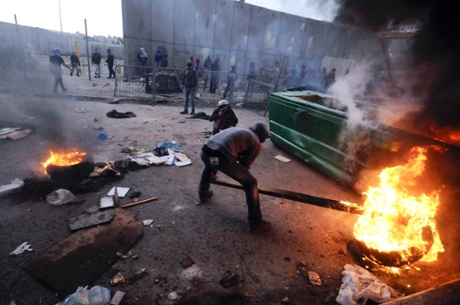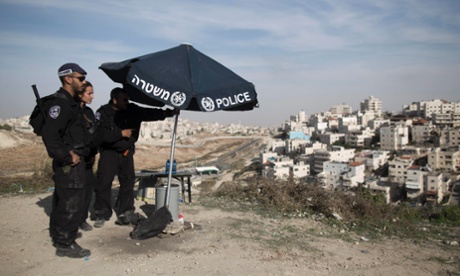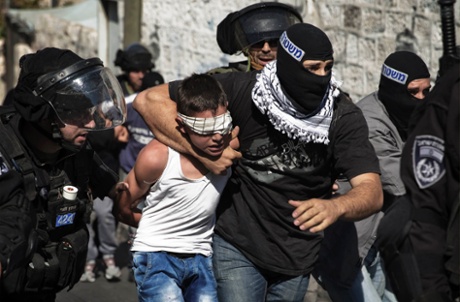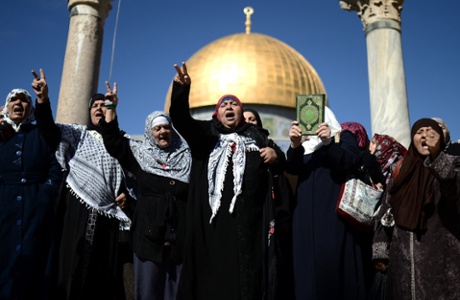القدس على شفا الثورة وكيري في عمان لإطفاء شعلتها بالتعاون !
Jerusalem on the edge as tensions over holy site threaten to boil over
Clashes and lethal attacks are increasing, bringing back memories of second intifada

Behind the campus of the Hebrew University a scrubby hill drops steeply to the East Jerusalem village of Isawiya.
Two weeks ago a squad of riot police was hiking down the path to the first houses. Who the police were chasing was evident immediately: handfuls of Palestinian youths – many very young – one group jogging across the cemetery below trying to approach close enough to throw their stones.
A week later – and a few short miles away across the city – it was a different scene: an arm under a plastic sheet was all that was visible of Ibrahim al-Akari, lying where he was shot after driving his van through two groups of pedestrians at a tram stop in Jerusalem, killing two.
These scenes connect two of the dots in Jerusalem’s increasingly violent tensions of recent months which – in the past three weeks – have threatened to metamorphose into something more dangerous.
A background of continued provocation on both sides since mid-summer has created the context for more serious events, including two lethal hit-and-run attacks and the attempted assassination of a far-right Jewish religious activist – Yehuda Glick – all in Jerusalem.
Among those killed in the hit-and-run attacks have been a three-month-old child, Chaya Zissel Braun, struck in her stroller, a Druze border policeman, Jedan Assad, and a 17-year-old religious student, Shalom Baadani.

It is a violence that now appears to be spreading: to Israel’s Arab towns, after a man was shot dead by police while being arrested, and to Tel Aviv and the occupied West Bank – the scene of two fatal stabbings by Palestinians of Israelis on Monday.
If the clashes and attacks reflect overlapping discontents, there is one issue that appears to be acting as the most dangerous accelerant – a campaign for Jewish prayer access by a minority of religious rightwingers at the site in the Old City known to Muslims as the Noble Sanctuary and revered as the third holiest site in Islam, and to Jews as the Temple Mount, site of the Second Temple.
Although the Israeli prime minister, Binyamin Netanyahu, and other senior Israeli politicians insist there is no plan to change the “status quo” there – which allows Jews and Christians to visit at certain hours but not to pray – that campaign, which has included visits by prominent MPs, has escalated tensions.
That in turn recently saw the first full closure of the site by Israeli police in decades, and a police raid into the building of al-Aqsa mosque itself – an event that led to widespread outrage in the Muslim community.
The increase in violence has imposed itself on the city’s life in different ways. Unlike during the second intifada, when suicide bombers came into the centre of Jerusalem, the most serious of the recent attacks have taken place along the line that divides occupied east and west, Palestinian and Jew. For those living in many central areas the sound of police stun grenades and teargas on one side, and firecrackers let off by Palestinian youths on the other, has become an almost nightly ritual. Hundreds of extra police have been drafted into the city and observation balloons deployed above the flashpoint neighbourhoods. Concrete blocks have been placed on the platforms of tram stops to stop cars being driven into passengers.
For now restaurants and bars in the west are still busy, although some Tel Aviv schools – to the anger of officials – have cancelled school trips to the city.
“It’s not like when I was a teenager during the last intifada,” says Irit, a municipal worker, waiting at a bus stop not far from central Jaffa Street, who declines to give her second name. “It’s not that bad yet. But I’m more wary now in public places.” Others talk of not using the light rail or avoiding driving on roads where stones might be thrown.
It is a sense of anxiety echoed up by the columnist Alex Fishman, writing in Yedioth Ahronoth on Tuesday.
“This is the same soundtrack that we all remember from the days of the [second] intifada: you haven’t yet had time to come to terms with the morning’s terror attack and you’re already wallowing in the next one … And you’ve come to feel that same oppressive sense of threat to your personal safety, and everyone, without waiting for instructions from above, begins to ask themselves: should I or shouldn’t I drive into Jerusalem? Should I or shouldn’t I board the bus? Should I or shouldn’t I wait at the train station?”

On the Palestinian side there is an equal nervousness still lingering from the summer when rightwing gangs launched a series of attacks against Palestinians.
And another difference with the second intifada – as police officials and observers note – is that those carrying out the recent attacks appear not to have been organised and sent by militant groups but have decided to act on their own.
David Tsur, an Israeli MP from the party of the justice minister, Tzipi Livni, and a former commander of the border police, acknowledges blame on both sides, identifying an intersection of causes. “One is that there is no future in the peace negotiations of any kind. Discussions and channels between [the Palestinian president] Mahmoud Abbas and Binyamin Netanyahu are almost non-existent. That is one of the main reasons why this is escalating.
“Then there is the Temple Mount issue, which has not been handled sensitively enough.”
In common with many Israeli political figures, however, Tsur blames Abbas for raising the heat in East Jerusalem while keeping things quiet in the West Bank – where unrest might threaten him.
If there is an irony in what is happening, it is that it is largely occurring inside the huge expanse of the concrete separation wall Israel built at the end of the second intifada to minimise attacks.
And if Ibrahim al-Akari’s hit-and-run attack last week marked a turning point of sorts, it has been because of two discrete and linked reasons. Unlike after previous incidents, Akari’s family made no attempt to deny what he had done. Instead they linked it directly to the Israeli raid into al-Aqsa last Thursday morning which they said had prompted his actions.
“My brother was a simple man,” said Ayoub al-Akari at the mourning tent. “He was very religious but he didn’t belong to any of the factions. This all started with the killing of the child Mohammad Abu Khdeir during the summer [by Jewish extremists] … The war in Gaza made things worse. Then there was the raid on al-Aqsa.”

And despite what the Israeli government has said, many Palestinians do not believe there is no plan to change the status quo at the Noble Sanctuary. The grand mufti of al-Aqsa, Muhammad Ahmad Hussein, told the Guardian: “The problem has been the daily raids and assaults on al-Aqsa and the damage that has been done. The recent raid and closure are unprecedented in recent memory.”
The mufti, like many, doubts the insistence by Netanyahu that Israel does not want to change the status quo. “It is propaganda when they keep allowing settlers to enter the Noble Sanctuary. They are planning something. To divide it, perhaps. Al-Aqsa is a place for Muslims to pray. No one is allowed to share it.”
Most dangerous of all, perhaps, is how a dynamic of action and reaction appears to be driving the escalation.
The decision to flood Jerusalem with police reinforcements and new rushed legislation – including a sentence of up to 20 years for stone throwing – appear to have pushed Jerusalem closer to the edge.
Silwan, tucked in a deep cleft below the walls of the Old City, has long been on the frontline. That boiled over once again with the arrival, in the middle of the night last month, of Jewish settler families to take occupation of houses they had bought – by subterfuge, Palestinians allege.
It was the home too of Abdulrahman al-Shaludi, driver in the first of the two recent hit-and-run attacks, which claimed the lives of two pedestrians.
Sami Qaraeen, a mechanic, told the Guardian the large police presence had only angered people more. “If you walk around you will see all the police they have sent in to swamp the neighbourhood. They having been going from house to house looking for the kids involved in the clashes. It is unprecedented. They have undercover snatch squads and have set up an observation balloon. This afternoon they arrested five more. Now they say they will fine parents. They are introducing new laws almost every day.”
There is little sign it is discouraging the clashes.
Back in Shuafat refugee camp last Friday at a junction facing the main checkpoint, several hundred youths had gathered to throw stones and firecrackers at police who replied with plastic rounds and teargas. A masked teenage boy explained why he was there. “We are here for the sake of the martyr [Ibrahim al-Akari]. And because al-Aqsa means a lot to us. Because of that we are trying to provoke them.”

.jpg)


تعليقات